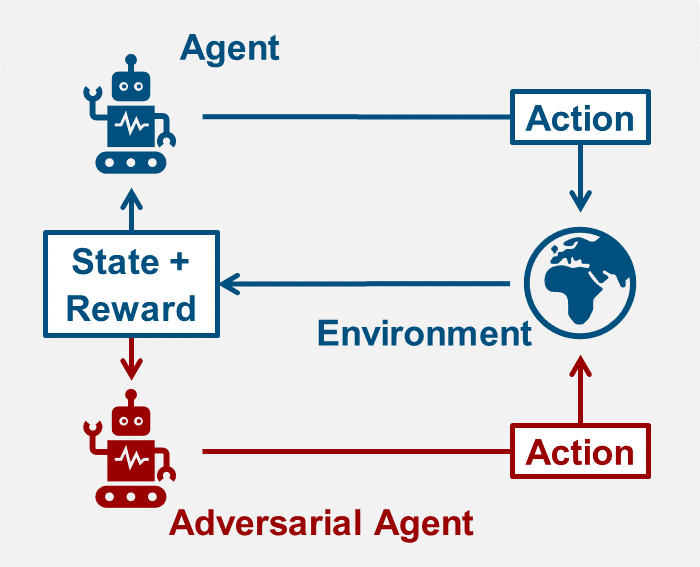
Adversarial reinforcement learning is a subfield of artificial intelligence that combines elements of both reinforcement learning and adversarial training. In traditional reinforcement learning, an agent learns to perform a task by interacting with an environment and receiving rewards or punishments based on its actions. Adversarial training, on the other hand, involves training a model to be robust against adversarial attacks, where an attacker tries to manipulate the model’s inputs to cause it to make mistakes.
In adversarial reinforcement learning, the goal is to train an agent to perform a task while also being robust against adversarial attacks. This can be particularly important in scenarios where the agent is deployed in a real-world environment where it may be vulnerable to attacks from malicious actors. By incorporating adversarial training into the reinforcement learning process, the agent can learn to anticipate and defend against potential attacks, making it more reliable and secure.
One common approach to adversarial reinforcement learning is to train the agent against a “shadow adversary” that tries to manipulate the agent’s inputs in order to deceive it. The agent is then trained to recognize and resist these manipulations, making it more robust against attacks. This can be particularly useful in scenarios where the agent is deployed in a safety-critical environment, such as autonomous driving or medical diagnosis, where even small errors can have serious consequences.
Another approach to adversarial reinforcement learning is to train the agent to actively defend against attacks by learning to detect and counteract adversarial inputs. This can involve training the agent to recognize patterns in the input data that indicate an attack, and to take appropriate actions to mitigate the effects of the attack. By incorporating this kind of defense mechanism into the agent’s training process, it can learn to be more resilient against a wide range of potential attacks.
Overall, adversarial reinforcement learning represents an important area of research in artificial intelligence, as it addresses the need for agents to be both effective at performing tasks and robust against attacks. By combining elements of reinforcement learning and adversarial training, researchers can develop agents that are not only capable of learning complex tasks, but also able to defend against potential threats in real-world environments. This can help to ensure the safety and reliability of AI systems in a wide range of applications, from autonomous vehicles to healthcare and beyond.
1. Improved robustness: Adversarial reinforcement learning helps improve the robustness of AI systems by training them to handle unexpected and adversarial inputs.
2. Enhanced performance: By incorporating adversarial training into reinforcement learning algorithms, AI systems can achieve higher levels of performance in various tasks.
3. Better generalization: Adversarial reinforcement learning can help AI systems generalize better to unseen scenarios and adapt to new environments.
4. Increased security: Adversarial training can also enhance the security of AI systems by making them more resilient to attacks and adversarial inputs.
5. Exploration of adversarial strategies: Adversarial reinforcement learning allows researchers to explore different adversarial strategies and understand how AI systems can be manipulated or deceived.
6. Potential for transfer learning: Adversarial reinforcement learning techniques can also be used for transfer learning, where knowledge gained in one task can be applied to another task.
7. Ethical considerations: Adversarial reinforcement learning raises important ethical considerations, such as the potential for AI systems to be used maliciously or to cause harm.
1. Game playing: Adversarial reinforcement learning can be used to train agents to play games against human opponents or other agents.
2. Cybersecurity: Adversarial reinforcement learning can be used to detect and defend against cyber attacks.
3. Robotics: Adversarial reinforcement learning can be used to train robots to navigate complex environments and interact with humans.
4. Finance: Adversarial reinforcement learning can be used to optimize trading strategies and predict market trends.
5. Healthcare: Adversarial reinforcement learning can be used to develop personalized treatment plans and predict patient outcomes.
There are no results matching your search.
ResetThere are no results matching your search.
Reset